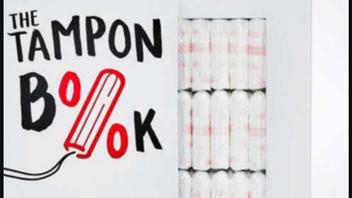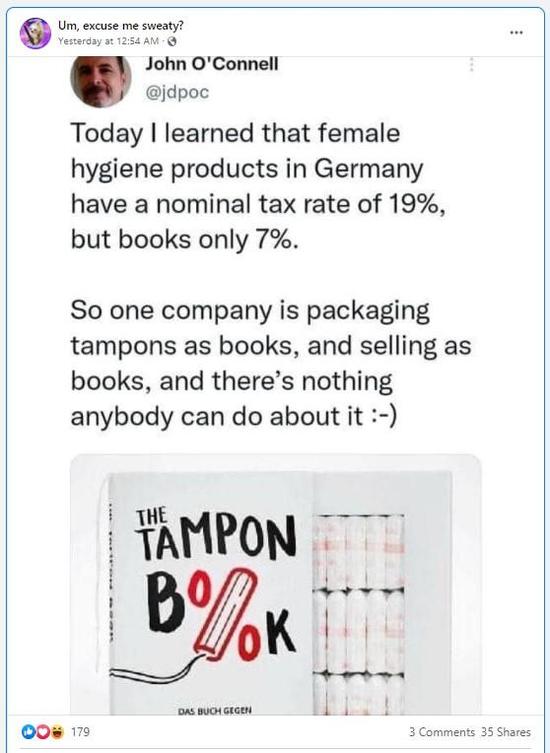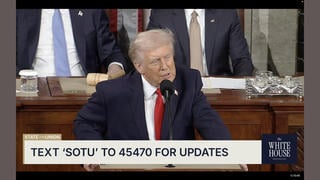
Is a German company packaging tampons as books (which have only a 7% tax rate) as a means of getting around a 19% tax on tampons? No, that's not true: "The Tampon Book" was a real thing, but it was created as a novel ad campaign or protest publicity stunt to raise awareness about the German tax code classifying tampons as a "luxury item" and taxing them at 19%. The book was a part of a successful campaign that also had a separate change.org petition. The tax code was changed in 2019 and went into effect on January 1, 2020 -- currently the tax rate for tampons in Germany is 7%.
The Tampon Book was introduced on the website of The Female Company on April 15, 2019, and was featured in many articles online. The topic recently resurfaced in a tweet published by @jdpoc on March 24, 2022. A screenshot of that tweet was posted on Facebook on March 29, 2022. The text in the screenshot reads:
Today I learned that female hygiene products in Germany have a nominal tax rate of 19%, but books only 7%.
So one company is packaging tampons as books, and selling as books, and there's nothing anybody can do about it :-)
This is how the post appeared at the time of writing:
(Image source: Facebook screenshot taken on Wed Mar 30 15:41:56 2022 UTC)
This fact check is to offer the additional context that "The Tampon Book, A book against tax discrimination" was part of a successful campaign that ended when the tax law was changed.
A gender equality petition against the tampon tax was originally launched on July 21, 2015, and was renamed, "Periods aren't a luxury - cut the tampon tax!" on March 15, 2018. The purpose of the campaign to change the value added tax rate applied to menstrual items was explained this way:
There are two different VAT rates in Germany: the general rate of 19% and the reduced rate of 7%. The reduced tax rate applies to basic groceries and other daily necessities. In addition to bread and potatoes, 'daily needs' also include salmon caviar, cut flowers and decorative images.
Menstrual items, i.e. tampons, pads, menstrual cups, panties, etc. fall under the 'luxury items' category according to this classification, as they are taxed at 19%. But how should a woman avoid her period?
The high taxation of these products represents fiscal discrimination against women based on their gender, which the Basic Law actually does not allow.
"The Tampon Book, A book against tax discrimination" ("Das Buch gegen Steuerdiskriminierung") was launched on the website of thefemalecompany.com on April 15, 2019, and on the company's YouTube channel the next day. The novelty book included 15 organic tampons and 46 pages of facts and stories about menstruation. The book's promotional page also invited people to sign the petition at change.org. The award-winning protest concept was explained this way:
Our organic tampons have nothing to hide, so why conceal them in a book? We do this to protest against the unfair and sexist taxation on tampons, sanitary pads and other feminine hygiene products. In Germany, these are still considered 'luxury goods' and therefore taxed with the top value added tax rate of 19 percent. Meanwhile, actual luxury products such as flowers, truffles or oil paintings are considered daily necessities and earn the reduced rate of only 7 percent. Is this crazy? Yes indeed! Luckily, we've found a loophole. Books are also taxed with 7 percent.That's why our tampons now come as a book, or rather inside a book.
On November 7, 2019, the page of the change.org petition was updated with a "victory" notice:
Dear supporters, we can hardly believe it, but we made it: from 2020, periods in Germany will finally no longer be a luxury! Instead of the current discriminatory and completely unjustified taxation of menstrual products at 19%, the Bundestag officially decided today to reduce it to the regular 7%!
The news of the German Bundestag's decision was reported by stern.de in an article, "It's official: Period products will be taxed at a reduced rate from 2020!"
Bundestagsentscheidung: Es ist offiziell: Ab 2020 werden Periodenprodukte ermäßigt besteuert! https://t.co/nxxR1KpCAA
-- stern (@sternde) November 7, 2019


















